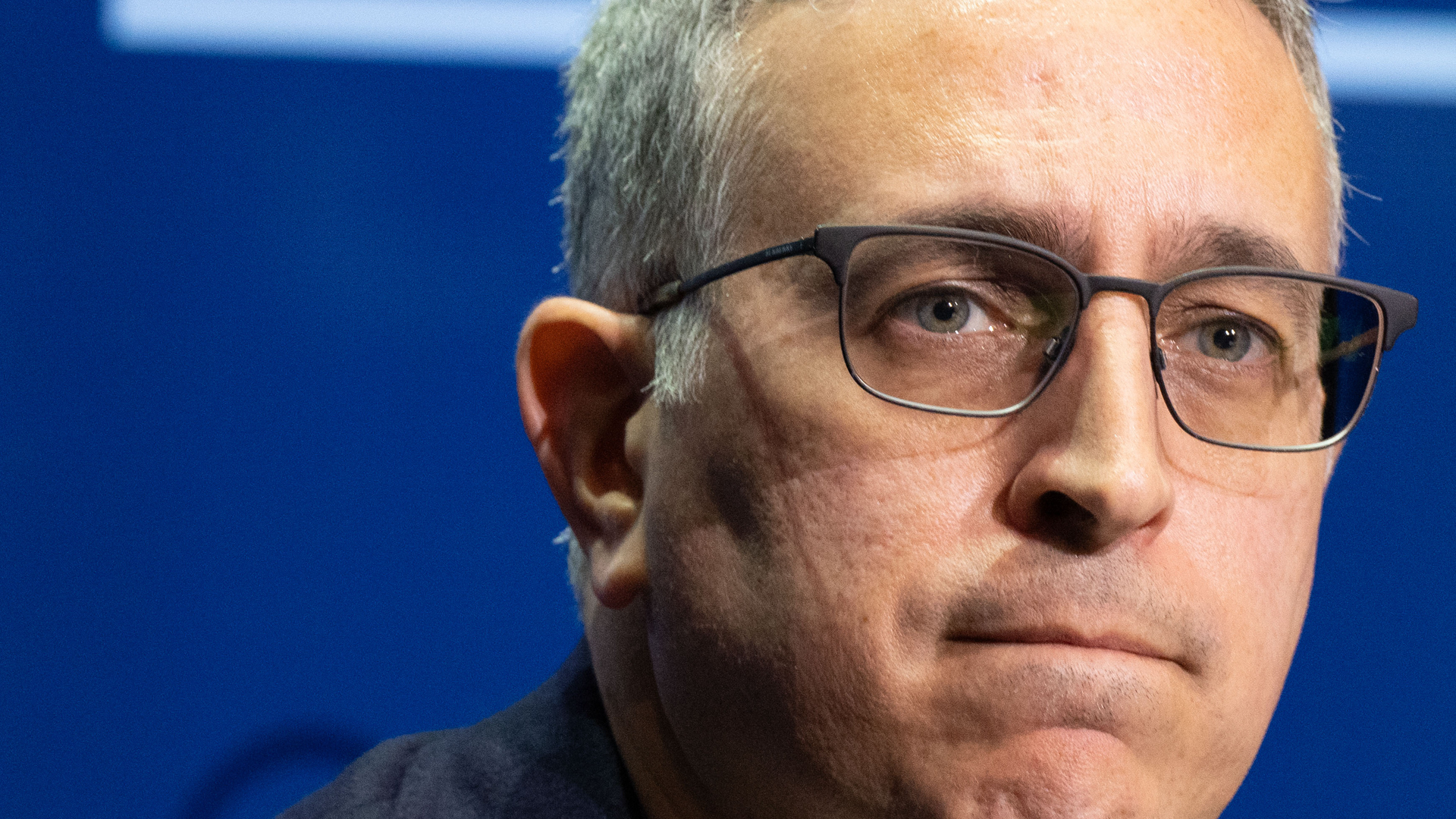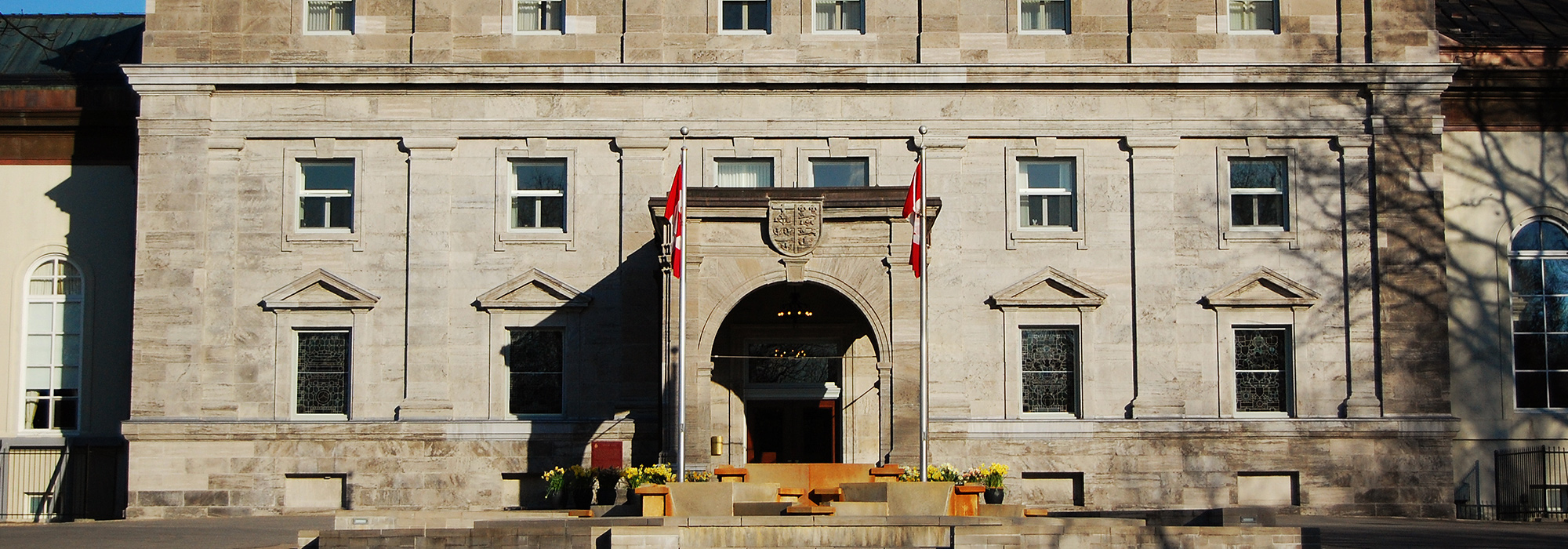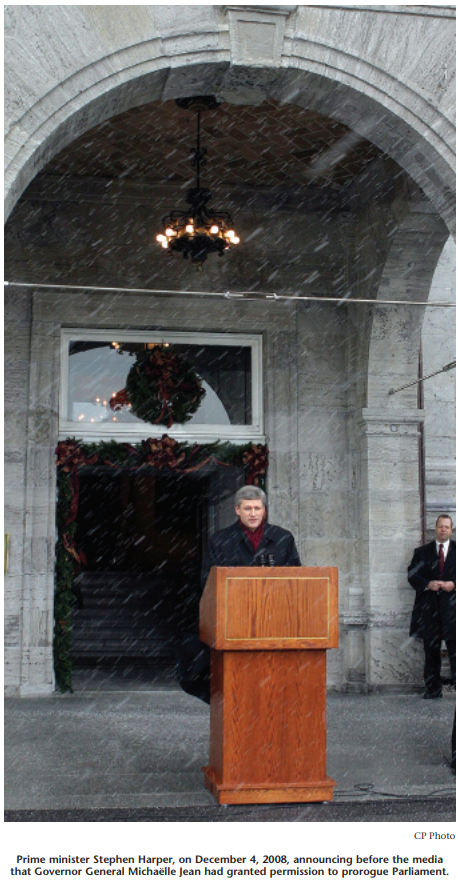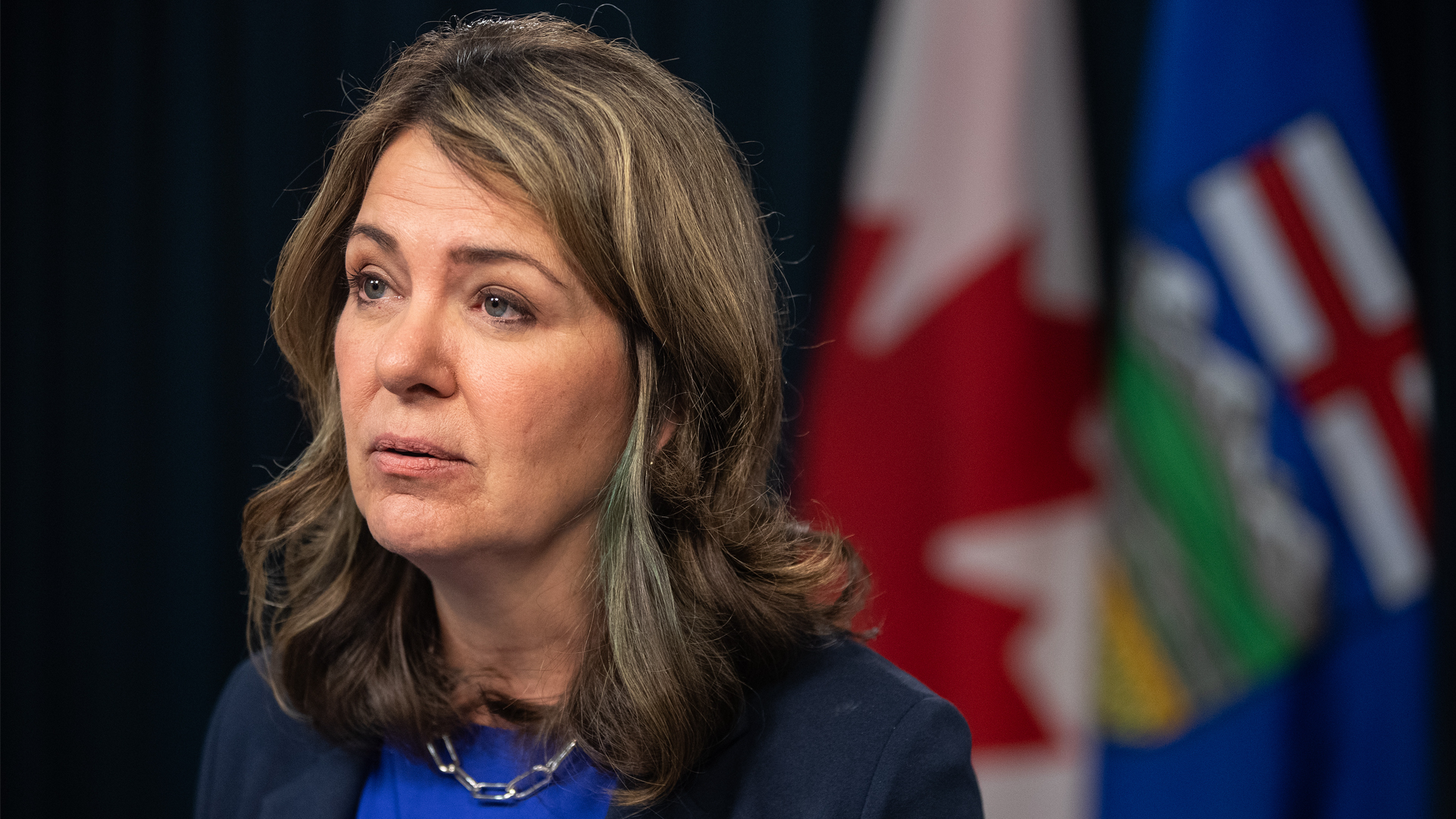
The controversies in Canada last December over a possible coalition government and the hasty prorogation of Parliament provide a vivid illustration of strengths and weaknesses of the role of the governor general.
The positive side of the current governor general’s involvement in December can be summarized very briefly. She left the decision-making to the elected politicians. This reflects the principles of constitutional monarchy that we have inherited from Great Britain, which do not normally give the governor general a substantive role in government. In December, members of Parliament ultimately had to act responsibly and respond to the views of Canadians, perhaps, in part, because there was no easy way to hand off the crisis they had manufactured to anybody else. Thus, by the time the new session of Parliament opened at the end of January, MPs had essentially turned their attention to Canada’s economic issues and other substantive challenges.
On the less positive side, the Governor General’s involvement in the December controversies, incidental though it turned out to be, provided numerous reminders that our constitutional tradition is historically a product of the same culture that produced the stories of Lewis Carroll, not to mention The Goon Show and Monty Python. Carroll’s Through the Looking Glass and What Alice Found There, especially, is all too relevant to an understanding of Canadian constitutional practice.
As we saw in mid-December, in Canada we respond to crises about the “rules of the game” that appear too difficult for professional politicians to resolve by hastily arranging a “visit” between the prime minister and an official whose credentials normally would not include expertise, demonstrated aptitude or even particular interest in constitutional issues.
The Governor General’s urgent return from distant lands last December was precipitated by her duty to receive a request for the prorogation of Parliament, even though it was generally agreed that she had little choice in prorogation requests and was obliged in such a request to accept what is described as “advice” from the prime minister. While we do not know what transpired at this meeting, behind the impressive doors of Rideau Hall, we can safely assume that the Prime Minister “advised” the Governor General to agree to his request. Nevertheless, many Canadians professed to be in suspense about the outcome of the meeting because, although the governor general generally accepts “advice,” he or she cannot be compelled to do so, since the only written description of her powers makes them virtually unlimited. Following the visit, only the Prime Minister appeared before the media to break the suspense and confirm that his advice had indeed been accepted. This confirmation was, in turn, accepted without question, despite the Governor General’s conspicuous absence.
While these inspirational events were unfolding in Ottawa, heated controversy raged throughout the land about the meaning of unwritten limitations to the governor general’s authority known as “constitutional conventions,” which are described in political science texts as constitutional norms and principles that are, by definition, generally agreed upon. In December controversy was especially heated over the governor general’s authority to refuse a request by a prime minister for the dissolution of Parliament and an election, in the event of a no-confidence vote and the emergence of another parliamentarian plausibly claiming to possess the confidence of the House.
How a governor general is to assess the plausibility of such a claim remains, apparently, unwritten somewhere within the realm of conventions. Although this was not the subject of controversy, the comments by experts in December did little to clarify the issue. It seems that in response to such a claim, the governor general must do as the investigative journalists assembled at Rideau Hall did on prorogation day, and simply believe the parliamentarian making the claim (in this case, as long as other people say they will support the person).
Even in the heat of the controversy, all agreed that the governor general is obliged to remain above the partisan fray of politics and make decisions, including a refusal to accept the advice of a prime minister, in an impeccably non-partisan manner (although nowhere is this written). The fact that prime ministers appoint governors general (here again, by convention, rather than according to the letter of the Constitution, which still assigns the task to the Queen) was not seen to be an obstacle to the governor general’s neutrality. Indeed, even the fact that a governor general is frequently the choice of a prime minister whose party occupies the opposition benches by the time a crisis arises, and that vociferous opposition to the government is likely to be central to that crisis, is also not a problem. Nor is the possibility that the appointment of the governor general may have been politically controversial, opposed by those who now provide her with “advice.”
As we saw in mid-December, in Canada we respond to crises about the “rules of the game” that appear too difficult for professional politicians to resolve by hastily arranging a “visit” between the prime minister and an official whose credentials normally would not include expertise, demonstrated aptitude or even particular interest in constitutional issues.
Although the coalition controversy has waned, at least for now, the minority government situation to which it gave rise persists. As well, the gradual increase over the years in the number of political parties in the House increases the probability of minority governments, volatile parliaments, the strategic use of prorogation, votes of no confidence and the reemergence of the December controversies. Thus, on a purely practical level, it would be useful if Canadians could achieve a measure of consensus about how to respond. Aside from contributing to more effective governance, this might avoid the impression of dignified formality barely concealing frantic improvisation that is, alas, all too characteristic of our constitutional tradition and was amply apparent in December.
Apart from the practical considerations, there is also the ever-present possibility that — in a world of emerging democracies, globalization and the associated proliferation of international conferences — someone, somewhere will ask a Canadian to explain the role of the governor general in constitutional crises, in the context of Canada’s ostensible membership in the family of democratic nations. It is even possible that the question may be directed to Canada’s symbolic head of state herself, given her role as a national representative abroad. For our sake, for hers and for that of other countries that might be tempted by emulation, we need to find a credible role for the governor general, and we need to find common-sense solutions to the issues that arose in December.
It is instructive that the Governor General’s acceptance of the Prime Minister’s request to prorogue the House for two months over Christmas did not embroil her in partisan criticism, even though her decision was controversial. There may well be political reasons why she was spared. One reason might be that some of the coalition partners were more faint-hearted about the prospect of an immediate opposition coalition than was indicated in their public pronouncements. More important, however, the convention that the governor general accepts prime ministerial requests for prorogation, except for exceptional instances where a prorogation amounts to a clear attack on the operation of parliamentary government, directed the attention of both critics and supporters to the actual decision-maker — the Prime Minister. His decision to request the prorogation, and not the formality of its being granted, was the subject of debate. He will ultimately be accountable to voters for this decision, along with the broader performance of his government. In a democracy, this is as it should be.
The challenge concerning the prorogation convention, therefore, is to clarify it rather than fundamentally alter its current operation. Controversies over future strategic prorogations could be alleviated by more definite “rules of the game” about what is acceptable, and what is not. Public debate in December suggested that clarity would be especially useful concerning issues such as the length of a prorogation, its timing in relation to a preceding election and/or the commencement of the Parliament to be prorogued, and the effect of the prorogation on the broader functioning of parliamentary government.
During the December debate, a number of authorities suggested that a brief prorogation, to allow a cooling-off period, would have been constitutionally innocuous. However, prorogation for a lengthier period, such as six months, would have posed a clear threat to the operation of our parliamentary system and thus raised constitutional concerns. The problem here is that a stipulated maximum prorogation length such as six months could have the effect of legitimizing prorogations of up to that length and could foster questionable prorogations rather than discouraging them. At the same time, stipulations concerning length or timing are at least precise, and are thus potentially the most useful type of clarification.
A convention that any prime minister who has used prorogations to prevent Parliament from sitting for more than a total of six months during a calendar year, or who prorogues Parliament twice during a calendar year without an intervening election should seek dissolution of the House and an election might provide an appropriate balance between precision and flexibility.
Such an arrangement would put the initiation of this extraordinary proceeding into the hands of elected politicians, who are ultimately accountable to electors for what they do. It would also give Canadians a more credible basis for believing that the resulting constitutional decision is based on substantive competence. The governor general would perform an almost entirely symbolic role, as befits this office in a democratic and meritocratic age.
Even if one provides greater precision about the frequency and length of prorogations, there are still grey areas, and doing so does not directly address the central constitutional concern that prorogations may raise: their possible use to impede the operation of parliamentary government. To resolve this, we should consider instituting a practice whereby the leader of the official opposition may, in response to a request by the prime minister to meet with the governor general concerning a prorogation, request an emergency meeting with the chief justice of Canada and alert the governor general that this request has been made. Under the existing arrangements, the chief justice already replaces the governor general in his or her absence or incapacity, and the chief justice, unlike the governor general, possesses substantive competence in constitutional law. So this proposal can be seen as an evolution of the status quo, rather than the introduction of an entirely foreign practice. If the chief justice is satisfied that a prorogation request would impede the operation of parliamentary government (based on consideration of the prime minister’s reasons for seeking it as well as the views of the opposition), then the chief justice would have the authority to instruct (or rather “advise,” according to our constitutional language) the governor general to deny the prorogation or reduce its length. This “advice” would prevail over that of the prime minister.
Such an arrangement would put the initiation of this extraordinary proceeding into the hands of elected politicians, who are ultimately accountable to electors for what they do. It would also give Canadians a more credible basis for believing that the resulting constitutional decision is based on substantive competence. The governor general would perform an almost entirely symbolic role, as befits this office in a democratic and meritocratic age, and would be required — on the exceptional occasions where the opposition leader has raised concerns at all — only to defer a response to a prime ministerial request for prorogation until he or she has received advice from the chief justice.
A second possible use of what is known as the governor general’s residual power occurs when a sitting prime minister loses the confidence of the House of Commons this was much discussed in December and January. If another individual has a plausible claim to possess the confidence of the House, and thus the capacity to govern, the governor general can, in theory at least, call upon that individual to form a government, even if the prime minister is requesting the dissolution of Parliament and an election.
During the December controversy, proponents of various party positions disagreed with one another vigorously about what the governor general should do in such an event. Leaving aside the issue of what the governor general should actually do, the mere existence of such widespread disagreement raises doubt about whether it is appropriate to rely on the governor general to resolve disputes, in an era when the Crown does not elicit the deference it might have done in previous generations and conspicuously possesses none of the sources of legitimacy — democratic or substantive — that might provide an acceptable contemporary basis for resolving parliamentary crises about who should be prime minister.
The most recent test of the limits of the governor general’s authority concerning requests for dissolution occurred in the 1926 King-Byng dispute, when Governor General Lord Byng refused Prime Minister William Lyon Mackenzie King’s request to dissolve the House for an election, and instead called on the leader of the opposition, Arthur Meighen, to form a government. On the face of it, there was ample reason for Byng’s actions, since King had simply continued to govern in the wake of the 1925 election, even though the election had given the opposition Conservatives more seats than his governing Liberals. Meighen’s government lasted mere days, however, and the Governor General’s actions became a major issue in the 1926 election that followed the demise of the Meighen government. In the campaign, King presented himself as a democratic hero who had resisted the meddling of the Governor General, and the public rewarded him by electing a clear majority of Liberals.
There is room for debate about how much the King-Byng precedent tells us about constitutional conventions today. Indeed, as the December controversy suggests, we may not really have a solid convention, since issues about coalitions have arisen so rarely in Canada that we do not seem to have arrived at settled norms. However, if King-Byng tells us anything, it is surely that the public expects the governor general to avoid going beyond symbolic and ceremonial functions, if at all possible.
This would reflect the democratic conventions that have arisen to restrain the monarch and her designates over the centuries and put decision-making about who gets to be prime minister in the hands of electors and politicians. The governor general’s role would be to proceed as Governor General Michaëlle Jean did with respect to the prorogation request, and follow the advice of the prime minister, who is accountable to voters.
The rule of the game I am suggesting here would be that if a coalition topples a government, the governor general should continue to serve essentially as a ceremonial figure. Politicians should avoid putting her in a position where she is drawn into partisan disputes or substantive decisions, unless the Constitution is being subverted. If a government loses a confidence vote, the onus should clearly be on the prime minister to tell the governor general what to do.
An argument against this proposal is that it removes yet another check from our system of government, adds to the already excessive concentration of power in the hands of the prime minister, and destroys Parliament’s traditional capacity to make and unmake governments. Upon examination, however, these concerns are unconvincing.
This proposal would not so much remove a check upon the prime minister as it would subject him or her more directly to the ultimate check in our system, the democratic check that has existed since the achievement of the universal franchise. In the event that a coalition with solid public support voted no confidence in a government, political prudence would strongly favour giving that coalition an opportunity to govern, rather than going to the polls and risking receiving a (predictable) drubbing. Alternatively, a coalition without support would almost certainly not be able to maintain sufficient unity to govern; in such a case we would all be better off if the prime minister directed the governor general to grant a dissolution, following which an election would settle the issue. In the remote chance that an election resulted in a Parliament mirroring the one that had preceded it, public pressure would almost certainly change the dynamics in the resulting parliament and result in the kind of refocusing on the tasks of government that Canadians saw at the beginning of 2009.
If King-Byng tells us anything, it is surely that the public expects the governor general to avoid going beyond symbolic and ceremonial functions, if at all possible. This would reflect the democratic conventions that have arisen to restrain the monarch and her designates over the centuries and put decision-making about who gets to be prime minister in the hands of electors and politicians.
In all of these scenarios, the prime minister would be responsible, unambiguously, for actions taken, and could be held accountable sooner or later by voters. This is preferable to the current arrangements, in which the governor general is continuously at risk of being implicated in actions that reflect decisions taken by others or, worse still, of being a hapless agent who is seen as responsible for actions that in reality reflect the views of anonymous and unaccountable expert advisers. Unambiguous prime ministerial responsibility is also preferable to an arrangement in which the role of Parliament as a confidence chamber provides an unconditional rationale for the creation of ad hoc coalition governments that may have only a tenuous connection to what should be the ultimate reference point for a democratic government — the will of the people.
In European countries accustomed to coalition governments, first ministers who have lost support in the legislature not infrequently recommend the appointment of their successors. In this, their actions correspond approximately to the incentives outlined above. Clear prime ministerial responsibility, in these circumstances, could only help to foster enlightened behaviour. The expansion of the existing convention that the governor general follows prime ministerial “advice” to include all no-confidence situations would thus provide better governance, and it would take our system a step further along the path of subjecting the constitutional monarch to democratic constraint.
The modified conventions proposed above would place the responsibility for decisions clearly in the hands of individuals who are accountable to electors or, in truly extraordinary circumstances, an individual who at least might be expected to provide a rigorous justification of actions based on constitutional principles and take personal responsibility for those actions. The amended conventions thus remove the basis for secrecy perpetuated by the fiction that prime ministerial visits to the governor general are occasions for a soul-baring discussion that results in decisions that are actually made during these meetings. Indeed, visits for the purpose of conveying instructions, as proposed above, would need to be fully transparent so that electors could subsequently hold a prime minister accountable for the instructions provided or could understand the basis for positions taken by the chief justice.
Unlike the mysterious prime ministerial visit that occurred over the request to prorogue Parliament, future visits should be recognized as entirely ceremonial occasions, and, accordingly, they should occur in public. On such visits, the prime minister (or, on exceptional occasions suggested above, the chief justice) would present instructions to the governor general, accompanied by reasons. In the case of prime ministerial instructions about the dissolution of Parliament or the appointment of a new prime minister, a serious assessment of the parliamentary situation, poll results and other evidence of what the public actually wants would be appropriate, since responsiveness to the democratic will should be the ultimate test for politicians. If the chief justice was presenting the instructions to the governor general, a direct explanation from the source of the latter’s instructions would not only contribute to public understanding, but also enhance the legitimacy of the governor general’s actions concerning the exceptional prorogations.
Prime ministers’ (or chief justices’) clear accountability for decisions about prorogations and coalitions would ensure that governors general do not become entangled in political disputes that they have no democratic authority to resolve or associated with decisions for which they are not personally responsible. In addition to other benefits, this clarity could only enhance the credibility of governors general in the symbolic and ceremonial functions that they have performed so effectively over the years, and that the current governor general performs and her predecessor did perform with real distinction.
The task of restoring rationality to the governor general’s role is greatly simplified by the very characteristics of our constitutional tradition that have given rise to our present situation. The fact that currently the governor general’s role is largely defined by conventions enables us to change the role as required, without embarking on the perilous process of formal constitutional amendment. Indeed, short of a total rewrite, amending a constitution so riddled with words that no longer mean what they say, or say what they mean, would almost certainly prove impossible. Unfortunately, there is no convention about updating conventions. However, established practice provides some guidance, and in any case, as the Supreme Court has recognized, public acceptance is the essential ingredient. While in the past conventions have been modified as a result of general acceptance of actions by political decision-makers, the atmosphere of partisan discord that in recent times has prevailed in Parliament reduces the likelihood that a unilateral change of practice by the prime minister could achieve the required consensus, regardless of the strength of the justifications provided. A more difficult process, but one more likely to achieve ultimate success, would be to refer a government White Paper outlining the issues and options to a parliamentary committee, ideally a special joint committee of the Senate and the House of Commons that could leaven the democratic responsiveness of members of Parliament with the experience of senators with noteworthy constitutional qualifications.
The recommendations of this committee, if acceptable to Parliament, could be put before the people of Canada in a plebiscite, possibly to coincide with the next general election. If agreed on by a simple majority, the new conventions could then be adopted as the basis of future action by the prime minister, and duly reflected on the governor general’s Web site. This final stage — getting the conventions in writing — should not be ignored. It is a better alternative than relying on unwritten norms relating to situations so infrequent that they cannot realistically be maintained as conventions in the living political culture.
We need to agree on a civil, democratic procedure for dealing with controversial prorogations and with situations when governments lose the confidence of the House. Without such a procedure, we risk turning our governor general into an exceptionally well dressed schoolyard referee, who is faced with restoring order among the redfaced boys Canadians glimpsed in the weeks before Christmas. In a culture that is no longer sustained by affection for the monarchy and is increasingly devoid of deference to authority of any kind, there is real doubt that governors general can perform this role effectively. To embroil them in attempts to do so will almost certainly undermine the symbolic and ceremonial roles they now perform. There has to be a better way. We need to find it.
Photo: Shutterstock








